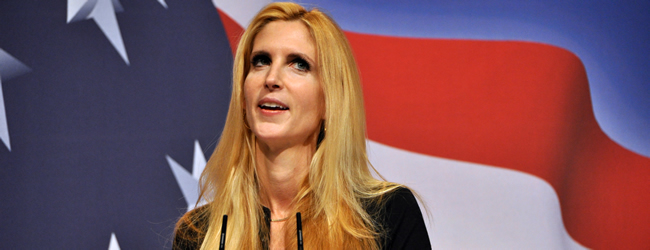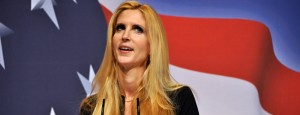News
Homocon was an affair to remember
Gay conservatives, Ann Coulter celebrate our fabulous freedom


Conservative pundit Ann Coulter brought her usual sense of audaciousness to last weekend's Homocon. (Blade file photo by Michael Key)
It was an affair to remember. Last Saturday, GOProud hosted its Homocon event, appropriating a term that has been used derisively to describe gay conservatives. The event, which organizers plan to make annual, took place at the Manhattan apartment of Peter Thiel, the billionaire co-founder of Pay Pal, who is based in the Bay Area.
The purpose of the event was to welcome GOProud supporters in a New York City venue and also make a national splash. But controversy quickly ensued as controversial Ann Coulter was the featured speaker. The event was something to behold: lots of hot young volunteers wearing tight “freedom is fabulous” T-shirts (a phrase coined in this column and newspaper), even hotter bartenders and wait staff and an apartment that made me wish that I had co-founded Pay Pal.
As I mingled around the room, I met people from just about everywhere. I met three Canadians who flew into New York just for Homocon. Other folks who traveled for the event were a North Carolinian, a Brit and a few from Los Angeles. There were also a lot of people from the District, GOProud’s home turf.
In sum, there were a lot of interesting people at the event, including a world-famous porn star. And, despite Esquire calling it a room of gay men, there were several women there. One of them was Margaret Hoover. She is a fabulous straight woman who is dedicated to marriage equality and is part of the American Foundation for Equal Rights. AFER’s purpose is to achieve marriage equality and is funding Ted Olson and David Boies’ court fight against Proposition 8.
Hoover had this to say about the event: “What’s unique about GOProud, particularly this event, is that they are the only group that actively strives to engage their skeptics. Debating Joe Farah and inviting Ann Coulter to speak demonstrates the best of the American system — that when we talk to each other reasonably, with respect and persistence, we can win hearts and minds. Hearts were changed at the World Net Daily Take America Back conference. With Ann, we listened and disagreed, but the effort to reach out instead of speaking in an echo chamber is remarkable.”
And I also disagreed. Coulter went on a rant against gay marriage. She also does not like lesbians, as was demonstrated by her calling the Mississippi high schooler who wanted to take her girlfriend to the prom an “annoying lesbian.” When Coulter says that she likes gays, she means gay males. But Coulter was only a small part of a bigger event.
Tammy Bruce, an author, Fox News commentator and lesbian feminist who ran the Los Angeles chapter of NOW for several years was at Homocon. We got a chance to chat in the hall of Thiel’s apartment:
Jessica Lee: What was your overall reaction to the Homocon event tonight?
Tammy Bruce: I think it’s terrific; it’s our generation.
Lee: Can you define “our generation?”
Bruce: Our generation is we who are moving into our 40s and 50s and had to deal with AIDS and the ignorance on that issue. It is a generation that has moved from wanting more from government to realizing that maybe less government is the answer. As we get older, we have a sense that we are now in charge of our lives and the country. And while our lives are not necessarily easy, we are doing well because we are Americans. And we have to ask ourselves why we are doing well, especially being in New York today where Iranian leader Ahmadinijad has recently been. That reminds you of the power and importance of this nation and the power of importance of what we can do with it.
So our generation, and being a right of center gay, is about embracing who you are, knowing the importance of activism but also being respectful that we wake up first as Americans every day.
As we get older, we also see what works and was doesn’t. We have learned that liberalism does not work. That is why, when someone like Barack Obama, who is my age, doesn’t get it, something is wrong with that person.
Lee: Don’t you also think that the young voters who embraced Obama had never seen the Carter years, gas rationing and stagflation, and take prosperity as a given?
Bruce: It is a younger generation, and just like every younger generation there is a whole host of things that they have missed. Our responsibility as people who have gone through certain things, going through the Carter years and the 70s and 80s, AIDS and the abortion wars — any time when any group wants to interfere with the nature of who we are and what we do, however that manifests, at first we worked on it thinking that government is the answer, but you find out as you get older that it is not. Whenever government gets involved not only does it get screwed up, but then they want more power. Then we lose our individual power. The only answer regardless of the economic situation is for people to be able to live the lives that they want to live: personally, in business and as entrepreneurs.
Lee: Tonight Ann Coulter made a comment that gays are high income and therefore should not complain about being discriminated against. Is that not the same argument that has been used against Jews for centuries?
Bruce: It is. And the interesting thing is that we do earn more money, because the system has forced us to be independent. Those who are more successful are more isolated from government controls and support and we find ways to make our lives better.
Lee: Because we can’t rely on our families or the government?
Bruce: Exactly. And so when you look at that in a larger context, those who rely on government are still in poverty and hurting right now. It’s not about being a Jew or being gay, it is about striking out on one’s own. That is the thing that makes a person a success.
Lee: Which is what Jews have always had to do to survive.
Bruce: Exactly. So when you look at, historically, what works and what doesn’t, we know what works. What works is small government, individual initiative and the American individualist sensibility. I think that bodes well for gay conservatives, because Americans really want what is best for their families and the future. Supporting gays might be at odds with their faith, or may not be, but the bottom line, especially with Obama, is that we now know that this nation is at risk, that we must work shoulder to shoulder, that we have more in common than not even though there are people who say otherwise.
I think tonight is very exciting because it highlights my generation that is the power generation that realizes what is important, what we need to do now, and it bodes well for the future. It also sends a very good message to young people: that there is a different way of doing things, and it is at least worth considering. And I think that a lot of people now are open to different ideas because what they were told was going to work with Barack Obama not only didn’t, but it is destroying things that are very important in our lives.
Lee: And don’t you think that when you give the government the power to help you, via ENDA or something similar, you also give the government the power to discriminate against you. And if you look at it, it is the federal government that does 99 percent of the discrimination against gay people.
Bruce: Well, exactly. If you are looking to the federal government you are looking to politicians and politicians only care about themselves. You can look at the Clintons—they did more damage to gay civil rights than any Republican ever in office. So politicians are politicians. No one is going to be our daddy. No one is going to be our savior but ourselves. As long as you look to the government to feel good about yourself in the morning, you’re in trouble. As long as you are looking for someone else to help you, then you are putting off something that you have to do yourself.
New York
Two teens shot steps from Stonewall Inn after NYC Pride parade
One of the victims remains in critical condition

On Sunday night, following the annual NYC Pride March, two girls were shot in Sheridan Square, feet away from the historic Stonewall Inn.
According to an NYPD report, the two girls, aged 16 and 17, were shot around 10:15 p.m. as Pride festivities began to wind down. The 16-year-old was struck in the head and, according to police sources, is said to be in critical condition, while the 17-year-old was said to be in stable condition.
The Washington Blade confirmed with the NYPD the details from the police reports and learned no arrests had been made as of noon Monday.
The shooting took place in the Greenwich Village neighborhood of Manhattan, mere feet away from the most famous gay bar in the city — if not the world — the Stonewall Inn. Earlier that day, hundreds of thousands of people marched down Christopher Street to celebrate 55 years of LGBTQ people standing up for their rights.
In June 1969, after police raided the Stonewall Inn, members of the LGBTQ community pushed back, sparking what became known as the Stonewall riots. Over the course of two days, LGBTQ New Yorkers protested the discriminatory policing of queer spaces across the city and mobilized to speak out — and throw bottles if need be — at officers attempting to suppress their existence.
The following year, LGBTQ people returned to the Stonewall Inn and marched through the same streets where queer New Yorkers had been arrested, marking the first “Gay Pride March” in history and declaring that LGBTQ people were not going anywhere.
New York State Assemblywoman Deborah Glick, whose district includes Greenwich Village, took to social media to comment on the shooting.
“After decades of peaceful Pride celebrations — this year gun fire and two people shot near the Stonewall Inn is a reminder that gun violence is everywhere,” the lesbian lawmaker said on X. “Guns are a problem despite the NRA BS.”
India
Anaya Bangar challenges ban on trans women in female cricket teams
Former Indian cricketer Sanjay Bangar’s daughter has received support

Anaya Bangar, the daughter of former Indian cricketer Sanjay Bangar, has partnered with the Manchester Metropolitan University Institute of Sport in the U.K. to assess her physiological profile following her gender-affirming surgery and undergoing hormone replacement therapy.
From January to March 2025, the 23-year-old underwent an eight-week research project that measured her glucose levels, oxygen uptake, muscle mass, strength, and endurance after extensive training.
The results, shared via Instagram, revealed her metrics align with those of cisgender female athletes, positioning her as eligible for women’s cricket under current scientific standards. Bangar’s findings challenge the International Cricket Council’s 2023 ban on transgender athletes in women’s cricket, prompting her to call for a science-based dialogue with the Board of Control for Cricket in India and the ICC to reform policies for transgender inclusion.
“I am talking with scientific evidence in my hand,” Bangar said in an interview posted to her Instagram page. “So, I hope, this makes an impact and I will be hoping to BCCI and ICC talking with me and discussing this further.”
On Nov. 21, 2023, the ICC enacted a controversial policy barring trans women from international women’s cricket. Finalized after a board meeting in Ahmedabad, India, the regulation prohibits any trans player who has experienced male puberty from competing, irrespective of gender-affirming surgery or hormone therapy. Developed through a 9-month consultation led by the ICC’s Medical Advisory Committee, the rule aims to safeguard the “integrity, safety, and fairness” of women’s cricket but has drawn criticism for excluding athletes like Canada’s Danielle McGahey, the first trans woman to play internationally. The policy, which allows domestic boards to set their own rules, is slated for review by November 2025.
Bangar shared a document on social media verifying her participation in a physiological study at the Manchester Metropolitan University Institute of Sport, conducted from Jan. 20 to March 3, 2025, focused on cricket performance. The report confirmed that her vital metrics — including haemoglobin, blood glucose, peak power, and mean power — aligned with those of cisgender female athletes. Initially, her fasting blood glucose measured 6.1 mmol/L, slightly above the typical non-diabetic range of 4.0–5.9 mmol/L, but subsequent tests showed it normalized, reinforcing the study’s findings that her physical profile meets female athletic standards.
“I am submitting this to the BCCI and ICC, with full transparency and hope,” said Bangar. “My only intention is to start a conversation based on facts not fear. To build space, not divide it.”
In a letter to the BCCI and the ICC, Bangar emphasized her test results from the Manchester Metropolitan University study. She explained that the research aimed to assess how hormone therapy had influenced her strength, stamina, haemoglobin, glucose levels, and overall performance, benchmarked directly against cisgender female athletic standards.
Bangar’s letter to the BCCI and the ICC clarified the Manchester study was not intended as a political statement but as a catalyst for a science-driven dialogue on fairness and inclusion in cricket. She emphasized the importance of prioritizing empirical data over assumptions to shape equitable policies for trans athletes in the sport.
Bangar urged the BCCI, the world’s most influential cricket authority, to initiate a formal dialogue on trans women’s inclusion in women’s cricket, rooted in medical science, performance metrics, and ethical fairness. She called for the exploration of eligibility pathways based on sport-specific criteria, such as haemoglobin thresholds, testosterone suppression timelines, and standardized performance testing. Additionally, she advocated for collaboration with experts, athletes, and legal advisors to develop policies that balance inclusivity with competitive integrity.
“I am releasing my report and story publicly not for sympathy, but for truth. Because inclusion does not mean ignoring fairness, it means measuring it, transparently and responsibly,” said Bangar in a letter to the BCCI. “I would deeply appreciate the opportunity to meet with you or a representative of the BCCI or ICC to present my findings, discuss possible policy pathways, and work towards a future where every athlete is evaluated based on real data, not outdated perceptions.”
Before her transition, Bangar competed for Islam Gymkhana in Mumbai and Hinckley Cricket Club in the U.K., showcasing her talent in domestic cricket circuits. Her father, Sanjay Bangar, was a dependable all-rounder for the Indian national cricket team from 2001 to 2004, playing 12 test matches and 15 One Day Internationals. He later served as a batting coach for the Indian team from 2014 to 2019, contributing to its strategic development.
Cricket in India is a cultural phenomenon, commanding a fanbase of more than 1 billion, with more than 80 percent of global cricket viewership originating from the country.
The International Cricket Council, the sport’s governing body, oversees 12 full member nations and more than 90 associate members, with the U.S. recently gaining associate member status in 2019 and co-hosting the 2024 ICC Men’s T20 World Cup. The BCCI generated approximately $2.25 billion in revenue in the 2023–24 financial year, primarily from the Indian Premier League, bilateral series, and ICC revenue sharing. The ICC earns over $3 billion from media rights in India alone for the 2024–27 cycle, contributing nearly 90 percent of its global media rights revenue, with the BCCI receiving 38.5 percent of the ICC’s annual earnings, approximately $231 million per year.
Women’s cricket in India enjoys a growing fanbase, with over 300 million viewers for the Women’s Premier League in 2024, making it a significant driver of the sport’s global popularity. The International Cricket Council oversees women’s cricket in 12 full member nations and over 90 associate members, with the U.S. fielding a women’s team since gaining associate status in 2019 and competing in ICC events like the 2024 Women’s T20 World Cup qualifiers. The BCCI invests heavily in women’s cricket, allocating approximately $60 million annually to the WPL and domestic programs in 2024–25, while contributing to the ICC’s $20 million budget for women’s cricket development globally. India’s media market for women’s cricket, including WPL broadcasting rights, generated $120 million in 2024, accounting for over 50 percent of the ICC’s women’s cricket media revenue.
“As a woman, I feel when someone says that they are women, then they are, be trans or cis. A trans woman is definitely the same as a cis woman emotionally and in vitals, and specially, when someone is on hormone replacement therapy. Stopping Anaya Bangar from playing is discrimination and violation of her rights. It is really sad and painful that every transwoman need to fight and prove their identity everywhere,” said Indrani Chakraborty, an LGBTQ rights activist and a mother of a trans woman. “If ICC and BCCI is stopping her from playing for being transgender, then I will say this to be their lack of awareness and of course the social mindsets which deny acceptance.”
Chakraborty told the Blade that Bangar is an asset, no matter what. She said that the women’s cricket team will only benefit by participation, but the discriminating policies are the hindrance.
“Actually the transgender community face such discrimination in every sphere. In spite of being potent, they face rejection. This is highly inhuman. These attitudes is regressive and will never let to prosper. Are we really in 2025?,” said Chakraborty. “We, our mindset and the society are the issues. We, as a whole, need to get aware and have to come together for getting justice for Anaya. If today, we remain silent, the entire community will be oppressed. Proper knowledge of gender issues need to be understood.”
The BCCI and the International Cricket Council have not responded to the Blade’s repeated requests for comment.
New York
Zohran Mamdani participates in NYC Pride parade
Mayoral candidate has detailed LGBTQ rights platform

Zohran Mamdani, the candidate for mayor of New York City who pulled a surprise victory in the primary contest last week, walked in the city’s Pride parade on Sunday.
The Democratic Socialist and New York State Assembly member published photos on social media with New York Attorney General Letitia James, telling followers it was “a joy to march in NYC Pride with the people’s champ” and to “see so many friends on this gorgeous day.”
“Happy Pride NYC,” he wrote, adding a rainbow emoji.
Mamdani’s platform includes a detailed plan for LGBTQ people who “across the United States are facing an increasingly hostile political environment.”
His campaign website explains: “New York City must be a refuge for LGBTQIA+ people, but private institutions in our own city have already started capitulating to Trump’s assault on trans rights.
“Meanwhile, the cost of living crisis confronting working class people across the city hits the LGBTQIA+ community particularly hard, with higher rates of unemployment and homelessness than the rest of the city.”
“The Mamdani administration will protect LGBTQIA+ New Yorkers by expanding and protecting gender-affirming care citywide, making NYC an LGBTQIA+ sanctuary city, and creating the Office of LGBTQIA+ Affairs.”
-

 U.S. Supreme Court3 days ago
U.S. Supreme Court3 days agoSupreme Court upholds ACA rule that makes PrEP, other preventative care free
-

 U.S. Supreme Court3 days ago
U.S. Supreme Court3 days agoSupreme Court rules parents must have option to opt children out of LGBTQ-specific lessons
-

 India5 days ago
India5 days agoIndian court rules a transgender woman is a woman
-

 National4 days ago
National4 days agoEvan Wolfson on the 10-year legacy of marriage equality












